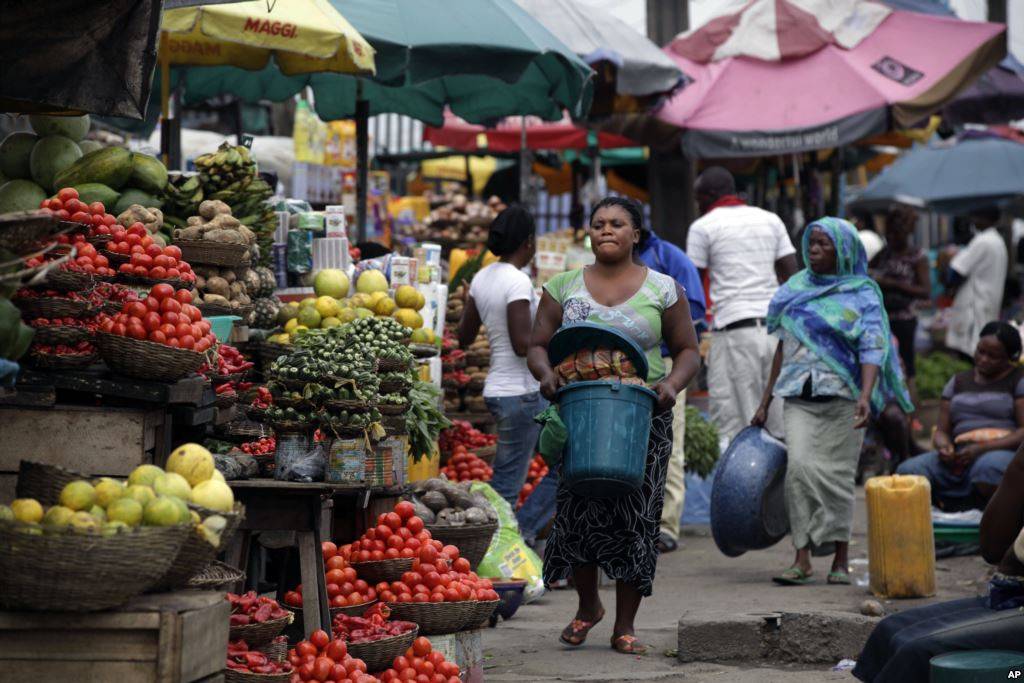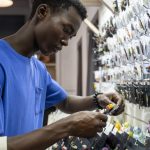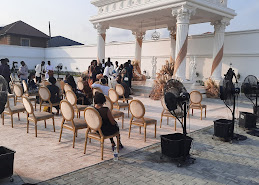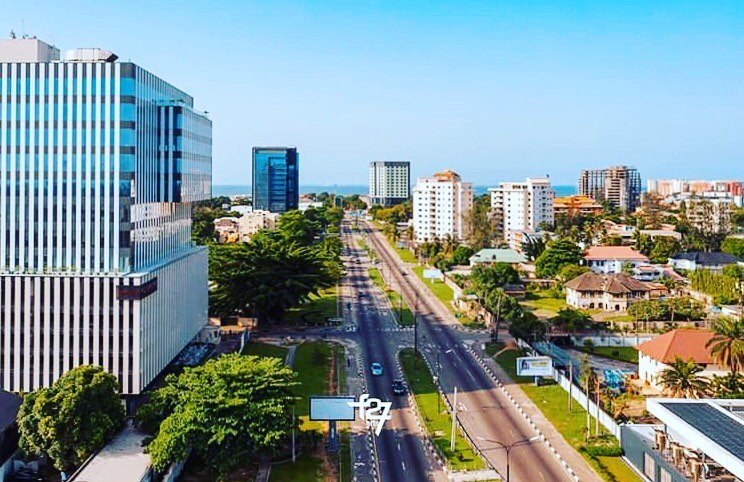Would you have guessed that Oshodi Market was established to facilitate the slave trade? During the 19th century, this was the case when Nigeria was under British colonial administration starting in 1860.
Located just north of the Idumota market, Oshodi Market is Nigeria’s second-largest market. Renowned for its vast size and diverse range of products, including clothing, accessories, electronics, household items, and traditional Nigerian artifacts, it’s a treasure trove for shoppers seeking variety and authenticity.
Oshodi Market projects the essence of Lagos – dynamic, diverse, and full of life. The market meets every need of seasoned shoppers, cultural enthusiasts, or those who are simply looking to immerse themselves in Lagos’ vibrant atmosphere,
The market is filled with a bubbling and lively atmosphere from its bustling stalls to its its flavorful street food, lively interactions, live music performances, cultural displays, and occasional street performances that add to the market’s lively atmosphere, you’ll never forget the unique shopping experience it’ll leave you in a hurry.
While the market offers you a relaxed shopping experience, especially if you are looking to purchase materials such as Ankara, lace, denim, and so on, Oshodi’s fabric market is the place to be. However, you must learn how to negotiate if you don’t want to spend more than your budget allows. Additionally, the market’s flexibility is fantastic, but so is the pricing. Everything here is reasonably priced, especially if you know how to negotiate effectively. The ability to bargain is a common practice at Oshodi Market. Be ready to negotiate prices with vendors for the best deals if not you’ll be paid more than what you budgeted. You need to hone your negotiating skills to get great deals and memorable shopping experiences.
The market is strategically located in the heart of Lagos, specifically in the Oshodi-Isolo Local Government Area, and offers a melting pot of commerce where traders and shoppers from different backgrounds come together here, creating a vibrant tapestry of languages, traditions, and stories.
Your visit to Oshodi Market is not complete without trying any of the Nigerian local delicacies. From “Akara” – A Nigerian food made from beans. The beans are blended into a paste, mixed with spices like onions and pepper, then deep-fried until crispy on the outside and soft on the inside, creating delicious bean balls, “Suya”, to roasted plantains, you’ll have a satisfying shopping experience
Operational Details in Oshodi Market
Oshodi Market opens from Monday to Sunday ensuring that shoppers get their favorite products throughout the week. Though the market operates daily, some days offer varying experiences
- Weekdays: Monday to Friday has a very relaxed atmosphere because these days, people are either in their various workplaces or they believe they won’t get better deals on their interested products.
- Weekends: Saturdays and Sundays are usually the busiest days in the market has shoppers want to get their hands on better products at better deals at the market. It’s usually filled with lively shopping experiences.
- Peak Hours: The market is always the busiest during the mid-morning to early afternoon, especially on weekends.
Safety Tips for Shopping at Oshodi Market
In as much as Oshodi Market promises a unique shopping experience, you must take some safety measures when visiting one of the second-largest markets in Nigeria.
This sprawling market can be chaotic, with narrow aisles and crowded shops, so keep the following tips in mind:
1. Have a Guide who’s Familiar with the Market: From far and near, the market boasts tens of thousands of traders daily. Traders; who have come to trade in textiles of numerous kinds, electrical appliances, electronics, jewelry, stationeries, movies, the list is endless. having no guide to assist you in shopping could make you fall victim to scammers. Please, do not go to Alaba International Market alone.
2. Don’t display valuables: Leave expensive phones, watches, jewelry, and bags at home or in your locked vehicle. Pickpockets target distracted shoppers, so don’t make yourself an easy mark.
3. Beware of your surroundings: Be alert in crowded areas like shop entrances or checkout lines. Keep bags closed and secure, and watch for people trying to reach into your pockets or bags. Stay near main walkways, avoiding isolated sections of the market.
4. Negotiate prices outside shops: Discuss prices with vendors outside their shops. This allows you to walk away easily, if needed, without feeling trapped inside. It also lets you compare offers from different vendors to get the best deal.
5. Trust your instincts: If anything feels off or makes you uncomfortable, leave the area immediately. Don’t hesitate to ask security guards or police officers for help if you feel threatened or sense danger. Your safety is the top priority, so get out of any situation that worries you.
6. Go to the Right Section: This is very important. If you’re looking to buy some home appliances, head to that section. In case you want a home appliance but find yourself in the attire section, you’ll be lost and confused. If you’re unfamiliar with the market, ask the right people and be cautious of scammers.
How to Get To Oshodi Market
Oshodi is a well-known landmark in Lagos, connecting many areas such as Berger, Mushin, Bariga, Isolo, Agege, Iyana ipaja, Ikeja, and many more. Nearly any vehicle park in Lagos will most likely have commercial drivers screaming out Oshodi.
So, if you’re looking at paying a visit to the market, here are detailed addresses and directions to Oshodi Market from various parts of Lagos.
From Ikeja to Oshodi Market:
– Board a bus heading towards Oshodi at Ikeja Along Bus Stop (also known as Ikeja Under Bridge Bus Stop). These buses typically have signs indicating “Oshodi” or “Oshodi Isale.”
– Alight at Oshodi Bridge Bus Stop. From there, it’s a short walk to Oshodi Market.
From Victoria Island to Oshodi Market:
– Take a bus from Victoria Island heading towards Oshodi. You can find these buses at designated bus stops along Adeola Odeku Street or Ozumba Mbadiwe Road.
– Alight at Oshodi Bridge Bus Stop and walk to Oshodi Market.
From Surulere to Oshodi Market:
– Look for buses going to Oshodi at bus stops along Western Avenue in Surulere. These buses often display “Oshodi” as their destination.
– Get off at Oshodi Bridge Bus Stop and proceed to Oshodi Market.
From Yaba to Oshodi Market:
– At Yaba, catch a bus going towards Oshodi at designated bus stops along Herbert Macaulay Way or Ikorodu Road.
– Exit the bus at Oshodi Bridge Bus Stop and make your way to Oshodi Market.
From Agege to Oshodi Market:
– Board a bus heading to Oshodi at bus stops along Agege Motor Road or Iju Road in Agege.
– Disembark at Oshodi Bridge Bus Stop and follow the route to Oshodi Market.
From Ajah to Oshodi Market:
– Take a bus from Ajah heading towards Oshodi. You can find these buses at designated bus stops along the Lekki-Epe Expressway or Admiralty Way.
– Upon reaching Oshodi Bridge Bus Stop, walk to Oshodi Market, which is nearby.
Conclusion
As we draw the curtain on our guide of the famous, second-largest market in Nigeria, you must note that Beyond shopping and dining, Oshodi Market offers a rich cultural experience. You get to Engage with friendly traders and locals, learning about their stories, traditions, and daily life in Lagos.
There’s a very popular saying about the Oshodi Market “You can find anything you want to buy” and that’s a very true statement. From fabrics to home items, electronics clothes, artifacts, food, and all.






